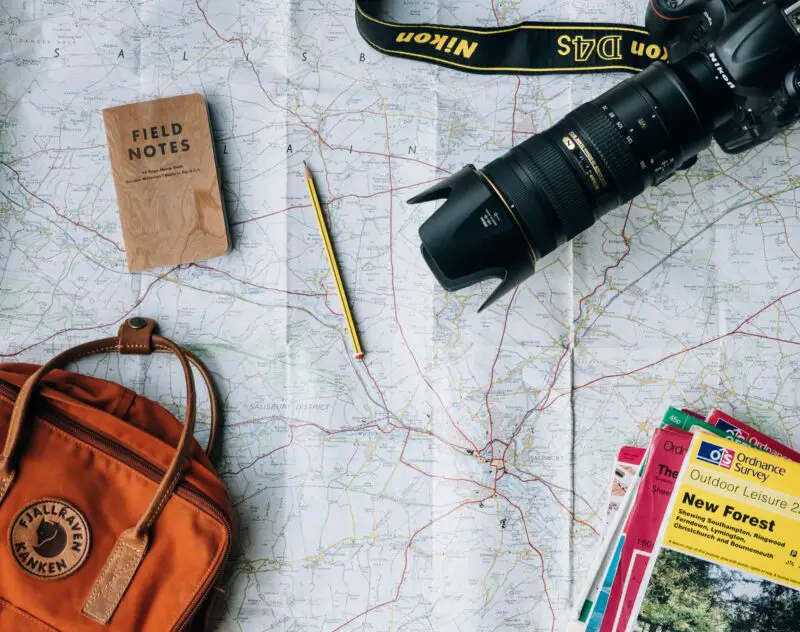A trip is generally shorter, with a specific destination in mind, while a journey is longer and more open-ended. A journey can also be internal, such as when we travel within ourselves to discover who we are
Definition of a trip
(Photo by Dino Reichmuth on Unsplash )

A trip is a travel experience. It can be a physical outing, such as a road trip, or it can be an emotional experience, such as a spiritual pilgrimage. A trip can also be a mental reflection, such as an inner exploration of your own psyche. Whatever form it takes, a trip is an adventure that expands your horizons and enriches your life. A trip generally refers to a shorter period of travel
A trip is generally shorter in duration than a journey and has a specific purpose or goal. For example, you might take a day trip to the beach, or a weekend trip to visit relatives.
Definition of a journey
(Photo by Vlad Bagacian on Unsplash )

A journey is an act of traveling from one place to another, especially when this is done over a long distance. A journey can be undertaken for many different reasons, such as visiting family or friends, going on vacation, or making a business trip.
There is no single definition of what constitutes a journey, as it can vary greatly depending on the individual. For some people, a journey may simply be going from their home to their workplace and back again each day. Others may consider a weekend getaway to be a journey. Ultimately, it is up to each individual to decide what they consider to be a journey.
A journey implies a longer and possibly more significant period of travel. A journey, on the other hand, can be much longer (think cross-country road trip) and doesn’t necessarily have a specific goal. It is usually longer and more open-ended. You might go on a journey to find yourself, or a journey to explore new lands.
Difference between a trip and a journey
So when deciding whether to call your next excursion a trip or a journey, think about whether or not you have a specific destination or purpose in mind. If you’re just going for the sake of going, it’s probably just a journey. But if you have an end destination or purpose in mind, it’s probably better to call it a trip.
A trip is generally shorter in duration than a journey, and it usually has a specific purpose or goal. For example, you might take a trip to the grocery store, or a trip to visit relatives. A journey, on the other hand
The Subjective Nature of the Distinction between a journey and a trip
The distinction between a journey and a trip is subjective and can vary based on personal perspective and cultural background. In general, a journey refers to a long, often difficult or life-changing, travel experience. This term is often used to describe a physical or spiritual quest, or a trip that is taken for a specific purpose. On the other hand, a trip is usually a brief excursion or vacation, taken for leisure or personal reasons.
However, the line between a journey and a trip can be blurry and there is often overlap between the two terms. For example, a trip to a foreign country to explore new cultures and experience personal growth could also be considered a journey. In the end, the distinction between the two is largely a matter of personal interpretation and perspective.
What to consider before taking a trip or a journey
Before taking a trip or a journey, it’s important to consider your personal goals, travel style, and budget. If you’re looking for a relaxing getaway with a specific destination in mind, a trip may be the right choice for you. However, if you’re seeking a more transformative experience that allows for personal growth and self-discovery, a journey may be a better fit.
It’s also important to consider your budget, as journeys can often be more expensive due to the longer duration and potential for spontaneous activities and detours. Additionally, consider your travel style, as journeys may require a more flexible and adaptable approach compared to a more structured trip.
How to prepare for a trip or a journey
Whether you’re taking a trip or a journey, preparation is key to ensuring a successful and enjoyable experience. For a trip, make sure to research your destination, book accommodations and transportation, and plan activities in advance. For a journey, it may be helpful to have a rough itinerary and a flexible attitude, as well as a budget that allows for unexpected expenses.
Regardless of whether you’re taking a trip or a journey, it’s important to obtain the necessary travel documents, such as a passport or visa, and to take out travel insurance to protect yourself in case of unexpected events.
Examples of trips and journeys
Examples of trips include:
- A beach vacation to Hawaii
- A city break to Paris
- A road trip through the countryside
- A ski trip to the mountains
- A family visit to a theme park.
Examples of journeys include:
- A backpacking trip through Southeast Asia
- A round-the-world trip
- A spiritual pilgrimage to a sacred site
- A gap year traveling and volunteering abroad
- A solo trip through the Amazon rainforest.
It’s worth noting that what may be a trip for one person can be a journey for another, depending on their personal goals and focus of the travel. The distinction between the two is largely subjective and can vary from person to person.
The Purpose of a Trip
The purpose of a trip can vary greatly depending on the individual and the circumstances surrounding the trip. Some common purposes for taking a trip include:
- Leisure and recreation: Trips taken for the purpose of relaxing and having fun, such as a beach vacation or a ski trip.
- Adventure and exploration: Trips taken to experience new cultures, try new activities, or explore new environments.
- Visiting friends and family: Trips taken to visit loved ones, either near or far.
- Business: Trips taken for work-related purposes, such as attending conferences, meetings, or sales trips.
- Education: Trips taken for learning or personal growth, such as study abroad programs or cultural immersion trips.
- Health and wellness: Trips taken for medical treatment or to improve one’s physical, mental, or emotional well-being.
The purpose of a trip can be different for each person, and the motivations and goals of a trip can greatly influence the overall experience of the traveler.
The Purpose of a journey
The purpose of a journey can vary greatly depending on the individual and the circumstances surrounding the journey. Some common purposes for taking a journey include:
- Personal growth and development: Journeys taken for the purpose of self-discovery and to gain a deeper understanding of oneself and one’s place in the world.
- Adventure and exploration: Journeys taken to experience new cultures, try new activities, or explore new environments.
- Fulfilling a dream or goal: Journeys taken to fulfill a lifelong dream or achieve a specific personal or professional goal.
- Seeking spiritual or religious enlightenment: Journeys taken to deepen one’s spiritual or religious beliefs or to seek a higher understanding of the world.
- Overcoming adversity or challenges: Journeys taken to overcome personal obstacles or to push one’s limits.
- Reflecting on the past or preparing for the future: Journeys taken to reflect on past experiences and to gain a new perspective on life.
The purpose of a journey can be unique to each person and can greatly influence the overall experience of the traveler. Whether it’s a physical, mental, or spiritual journey, the goal is often to learn, grow, and come back changed in some way.
The planning process before a trip or a journey
The planning process before a trip or a journey is an important part of ensuring a successful and enjoyable experience. Here are some common steps in the planning process:
- Determine the purpose and goals of the trip or journey: What do you hope to achieve or experience? Do you want to relax, explore new cultures, or fulfill a personal goal?
- Set a budget: Determine how much you can afford to spend on the trip and allocate funds for transportation, accommodations, meals, and activities.
- Research destinations: Gather information on the destinations you are considering, including the climate, culture, and local customs. Read travel guides, check online reviews, and talk to friends who have been there.
- Plan your itinerary: Decide on the places you want to visit, activities you want to do, and how much time you want to spend in each location.
- Book transportation and accommodations: Make arrangements for flights, trains, buses, or rental cars, and reserve a place to stay, such as a hotel, hostel, or vacation rental.
- Make arrangements for necessary travel documents: Check the requirements for entry into the countries you will be visiting and make sure you have the necessary visas and passport.
- Pack for the trip: Make a list of the items you need to bring, taking into consideration the climate, activities, and cultural customs of the destinations you will be visiting.
- Prepare for emergencies: Make copies of important documents, such as passports and travel insurance, and leave them with a trusted friend or family member.
By following these steps, you can ensure a smooth and enjoyable trip or journey, and be prepared for any unexpected events that may arise.
The Experience During the Trip or Journey
The experience during a trip or journey can vary greatly depending on a number of factors such as the destination, the mode of transportation, the company, and the individual’s personal preferences and expectations. However, here are some common experiences that people often have during a trip or journey:
- Excitement and Anticipation: Many people feel a sense of excitement and anticipation before embarking on a trip. They look forward to exploring new destinations, trying new things, and creating memories that will last a lifetime.
- Adventure and Exploration: A trip can be an opportunity to escape the daily routine and experience new things. People often explore different cities, try new foods, meet new people, and engage in new activities.
- Relaxation and Rejuvenation: For many people, a trip is a chance to relax and recharge. Whether it’s lying on a beach, taking a spa day, or simply getting away from the hustle and bustle of daily life, a trip can be a much-needed break.
- Challenges and Discomforts: While a trip can be a wonderful experience, it can also present challenges and discomforts. Delays, lost luggage, language barriers, and unexpected events can all add stress to a trip.
- Cultural Immersion: For travelers who seek to immerse themselves in a new culture, a trip can be an opportunity to learn about different customs, traditions, and ways of life.
Regardless of the specific experiences, a trip or journey can be a rewarding and memorable experience, providing a chance to step outside of one’s comfort zone, learn new things, and create lasting memories.
The Lasting Impact of a Trip or Journey
The lasting impact of a trip or journey can go far beyond just the memories created during the experience. For many people, travel can have a significant impact on their perspectives, values, and overall outlook on life. It can broaden one’s understanding of different cultures and lifestyles, and lead to a greater appreciation for diversity. Travel can also foster a sense of independence and self-reliance, as individuals navigate unfamiliar environments and learn to solve problems on their own.
In addition to personal growth, a trip or journey can also leave a lasting impact on one’s relationships. Traveling with friends or family can strengthen bonds and create shared memories, while meeting new people from different parts of the world can broaden one’s social network and lead to lifelong connections.
Finally, travel can have a profound impact on one’s career and future opportunities. Visiting new places can lead to new ideas, perspectives, and opportunities for personal and professional growth. Traveling for business can also help establish new partnerships and connections that can have a lasting impact on one’s career.
Overall, the lasting impact of a trip or journey can be far-reaching and long-lasting, shaping an individual’s personal and professional life in meaningful ways.
Trips vs Journeys: Common Misconceptions
There are several common misconceptions about the difference between trips and journeys, and people often use the terms interchangeably. However, there are some key differences between the two concepts:
- Length of time: Trips are typically short-term excursions, lasting anywhere from a few days to a few weeks. Journeys, on the other hand, are often longer and more extended experiences, lasting several months or even years.
- Purpose: Trips are often taken for leisure, relaxation, or as a break from daily life. Journeys, on the other hand, are often undertaken for a specific purpose, such as personal growth, spiritual enlightenment, or career advancement.
- Destination: Trips typically have a specific destination in mind, while journeys may be more open-ended and focused on the journey itself, rather than the destination.
- Mindset: A trip is often viewed as a way to escape from daily life, while a journey is often seen as a way to embrace new experiences and grow as an individual.
- Planning and preparation: Trips are often planned in advance, with specific activities and accommodations arranged beforehand. Journeys are often more open-ended, with less planning and preparation involved.
In reality, the line between trips and journeys can be blurred, and many travel experiences can encompass elements of both. The key difference is often one of perspective and mindset, with trips being viewed as a way to escape from daily life and journeys being seen as a way to embrace new experiences and grow as an individual.
How to Decide Whether a Trip or Journey is Right for You.
Deciding whether a trip or a journey is right for you depends on several factors, including your personal preferences, goals, and available time and resources. Here are some things to consider when making this decision:
Purpose: Consider what you hope to achieve through your travel experience. If you’re looking for a break from your daily routine and a chance to relax, a trip may be a better fit. If you’re seeking personal growth, cultural immersion, or a life-changing experience, a journey may be more appropriate.
Time and Budget: Consider how much time and money you have available for your travel experience. Trips are often shorter and less expensive, while journeys can be longer and more costly.
Destination: Think about where you’d like to go and what kind of experiences you hope to have. If you have a specific destination in mind, a trip may be the way to go. If you’re more open to exploring different places and taking things as they come, a journey may be a better fit.
Personal Style: Consider your personal travel style and preferences. If you enjoy planning and organizing your trips in advance, a trip may be a better fit. If you’re more spontaneous and enjoy the journey more than the destination, a journey may be a better fit.
The decision between a trip and a journey is a personal one that depends on your individual goals, preferences, and resources. It’s important to take the time to consider what you hope to achieve through your travel experience and choose the option that best aligns with your needs and desires.
Photo by Annie Spratt on Unsplash








